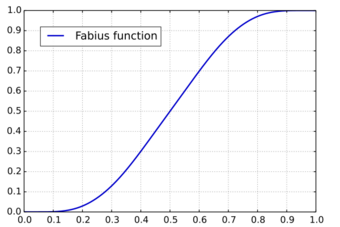Fabius function

In mathematics, the Fabius function is an example of an infinitely differentiable function that is nowhere analytic, found by Jaap Fabius (1966).
This function satisfies the initial condition , the symmetry condition for and the functional differential equation
for It follows that is monotone increasing for with and and and
It was also written down as the Fourier transform of
by Børge Jessen and Aurel Wintner (1935).
The Fabius function is defined on the unit interval, and is given by the cumulative distribution function of
where the ξn are independent uniformly distributed random variables on the unit interval. That distribution has an expectation of and a variance of .

There is a unique extension of f to the real numbers that satisfies the same differential equation for all x. This extension can be defined by f (x) = 0 for x ≤ 0, f (x + 1) = 1 − f (x) for 0 ≤ x ≤ 1, and f (x + 2r) = −f (x) for 0 ≤ x ≤ 2r with r a positive integer. The sequence of intervals within which this function is positive or negative follows the same pattern as the Thue–Morse sequence.
The Rvachëv up function[1] is closely related: which fulfills the Delay differential equation[2] (see Another example).
Values
The Fabius function is constant zero for all non-positive arguments, and assumes rational values at positive dyadic rational arguments. For example:[3][4]
with the numerators listed in OEIS: A272755 and denominators in OEIS: A272757.
Asymptotic
for where is Euler's constant, and is the Stieltjes constant. Equivalently,
for
References
- ↑ "A288163 - Oeis". https://oeis.org/A288163.
- ↑ Juan Arias de Reyna (2017). "Arithmetic of the Fabius function". arXiv:1702.06487 [math.NT].
- ↑ Sloane, N. J. A., ed. "Sequence A272755 (Numerators of the Fabius function F(1/2^n).)". OEIS Foundation. https://oeis.org/A272755.
- ↑ Sloane, N. J. A., ed. "Sequence A272757 (Denominators of the Fabius function F(1/2^n).)". OEIS Foundation. https://oeis.org/A272757.
- Fabius, J. (1966), "A probabilistic example of a nowhere analytic C ∞-function", Zeitschrift für Wahrscheinlichkeitstheorie und Verwandte Gebiete 5 (2): 173–174, doi:10.1007/bf00536652
- Jessen, Børge; Wintner, Aurel (1935), "Distribution functions and the Riemann zeta function", Trans. Amer. Math. Soc. 38: 48–88, doi:10.1090/S0002-9947-1935-1501802-5
- Dimitrov, Youri (2006). Polynomially-divided solutions of bipartite self-differential functional equations (Thesis).
- Arias de Reyna, Juan (2017). "Arithmetic of the Fabius function". arXiv:1702.06487 [math.NT].
- Arias de Reyna, Juan (2017). "An infinitely differentiable function with compact support: Definition and properties". arXiv:1702.05442 [math.CA]. (an English translation of the author's paper published in Spanish in 1982)
- Alkauskas, Giedrius (2001), "Dirichlet series associated with Thue-Morse sequence", preprint.
- Rvachev, V. L., Rvachev, V. A., "Non-classical methods of the approximation theory in boundary value problems", Naukova Dumka, Kiev (1979) (in Russian).
 |
